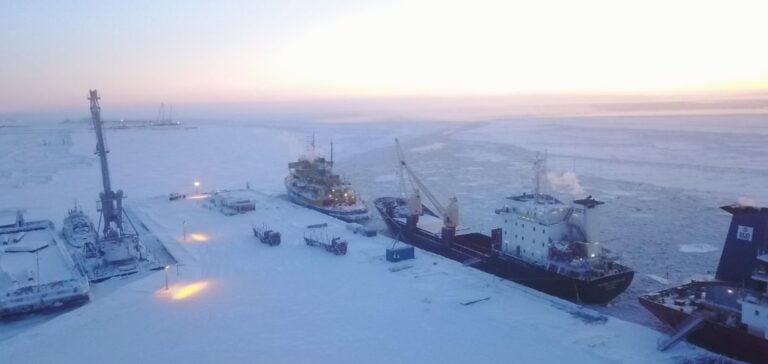Since Russia’s invasion of Ukraine in 2022, the United States has intensified its sanctions campaign aimed at limiting Moscow’s energy revenues.
The Arctic LNG 2 project, developed by Novatek PAO, is at the heart of Russia’s strategy to become a major player in the global liquefied natural gas (LNG) market.
However, recent US sanctions have blocked several companies and vessels associated with the project, including Gotik Energy Shipping Co, Plio Energy Cargo Shipping, as well as the vessels New Energy and Energy Mulan.
These vessels have been accused of using deceptive navigation practices, such as turning off their automatic identification systems, to transfer LNG offshore, thereby circumventing the sanctions.
The latest measures imposed by the US Treasury Department’s Office of Foreign Assets Control (OFAC) also include secondary sanctions against non-Russian companies supplying services or goods to the sanctioned entities.
For example, Turkish companies such as Denkar Ship Construction and ID Ship Agency Trade have been targeted for providing ship repair services to Russian companies under sanctions.
This extension demonstrates the United States’ determination to increase the operating costs of the Arctic LNG 2 project and complicate any international collaboration with Russia.
Russian Sanctions Avoidance Strategies
Faced with growing restrictions, Russia has adjusted its tactics to maintain a flow of LNG exports.
One of the methods observed is the use of ship-to-ship cargo transfers in lightly monitored sea areas, as illustrated by the case of New Energy and the Pioneer.
This approach enables ships to load LNG discreetly and transfer it to unsanctioned vessels, minimizing the risk of interception by Western authorities.
However, this method entails heightened security and compliance risks, as analyst Tom Marzec-Manser points out, using satellite data to monitor LNG vessel movements in the Arctic.
The use of floating storage units, such as those moored near Murmansk, is another method employed.
These units, although also under sanctions, are used to store LNG until buyers can be found.
However, this solution is not sustainable, as these facilities fill up quickly, which could force Novatek to reduce or temporarily halt production if unlocking solutions are not found.
Impact of Sanctions on Russian Transport Fleet and Energy Projects
The sanctions directly affect the fleet of ice-class vessels designed to navigate Arctic waters.
Unable to sell these vessels to Novatek because of the restrictions, companies have had to turn to purchasing older LNG vessels not suited to the extreme conditions of the Arctic.
This strategy, while necessary, increases the risk of breakdowns and accidents, raising operating costs and making LNG exports less competitive on the international marketSanctions are not limited to Arctic LNG
2. They also extend to other LNG projects in Russia, such as Obsky LNG, Arctic LNG 1 and Arctic LNG
3. This extension shows that US policy is not only aimed at restricting current capacities, but also at hindering Russia’s future developments in the energy sector.
International Partner Reactions and Geopolitical Consequences
The US sanctions are not only aimed at Russian companies; they also have consequences for Russia’s international partners.
Companies in countries such as Turkey, which had contracts with sanctioned Russian companies, are also affected by the new measures.
In geopolitical terms, these sanctions are redefining the dynamics of energy markets.
Russia’s Asian and Middle Eastern partners are increasingly faced with strategic dilemmas.
Engaging in transactions with sanctioned Russian entities may result in secondary sanctions and complicate their relations with Western countries.
This climate of uncertainty makes investment decisions riskier, which could slow the development of new energy infrastructures and affect the stability of global energy supplies.
Impact on the LNG Market and Future Alliances
With sanctions continuing to restrict Russia’s production and export capacities, global LNG flows are likely to undergo a reorganization.
Major LNG producers such as the USA, Qatar and Australia could take advantage of this situation to increase their market share at Russia’s expense.
At the same time, this could also push Moscow to strengthen its energy alliances with China, India and other non-aligned countries, potentially redefining geopolitical balances in the energy field.
Experts are also watching to see how US measures affect future production infrastructures.
The development of new technologies to circumvent restrictions, as well as the use of alternative financing mechanisms, could also change the game.
This highlights the need for energy market players to adapt quickly to geopolitical and regulatory developments in an increasingly polarized environment.





















